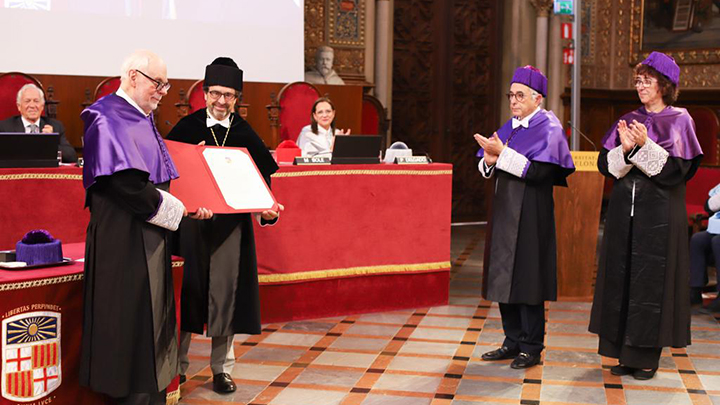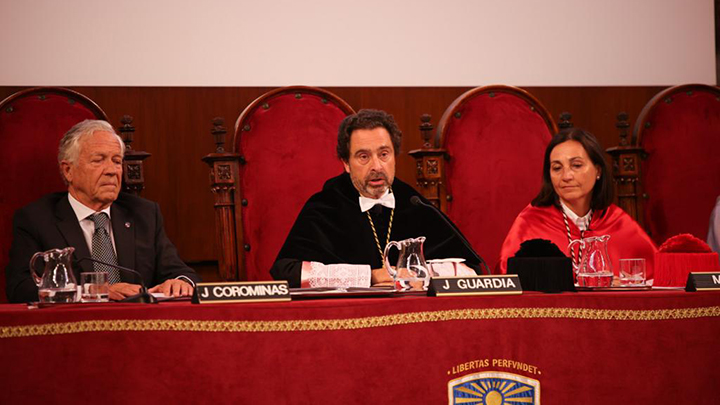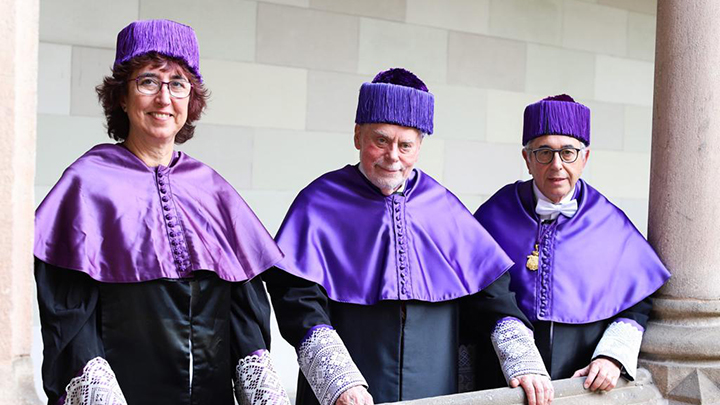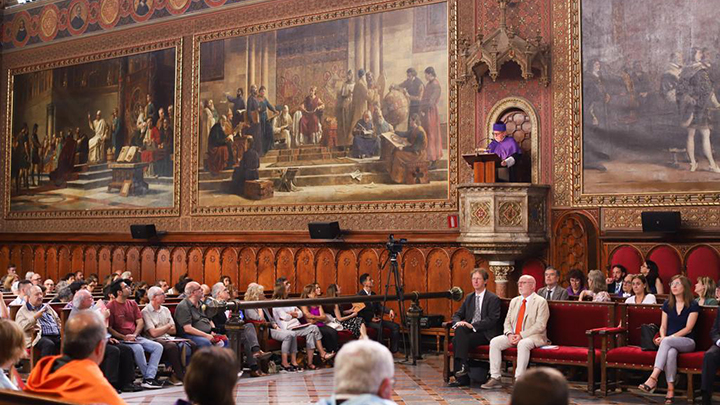Honorary doctorate awardee Fraser Stoddart highlights merit, expertise and generosity as key elements in scientific progress

News
|
Institutional
(13/06/2023)
Today, the University of Barcelona granted an honorary doctorate to Fraser Stoddart, professor at the Northwestern University (United States) and winner of the 2016 Nobel Prize in Chemistry, in a ceremony presided over by the rector of the UB, Joan Guàrdia. The sponsor was María Luisa Pérez Garcia, professor at the Department of Pharmacology, Toxicology and Therapeutic Chemistry of the Faculty of Pharmacy and Food Sciences and researcher at the Institute of Nanoscience and Nanotechnology of the UB (IN2UB).
At 4 pm, Professor Stoddart will give a lecture on “Artificial molecular machines” in the Aula Magna of the Faculty of Pharmacy and Food Sciences.
At 4 pm, Professor Stoddart will give a lecture on “Artificial molecular machines” in the Aula Magna of the Faculty of Pharmacy and Food Sciences.

News
|
Institutional
13/06/2023
Today, the University of Barcelona granted an honorary doctorate to Fraser Stoddart, professor at the Northwestern University (United States) and winner of the 2016 Nobel Prize in Chemistry, in a ceremony presided over by the rector of the UB, Joan Guàrdia. The sponsor was María Luisa Pérez Garcia, professor at the Department of Pharmacology, Toxicology and Therapeutic Chemistry of the Faculty of Pharmacy and Food Sciences and researcher at the Institute of Nanoscience and Nanotechnology of the UB (IN2UB).
At 4 pm, Professor Stoddart will give a lecture on “Artificial molecular machines” in the Aula Magna of the Faculty of Pharmacy and Food Sciences.
At 4 pm, Professor Stoddart will give a lecture on “Artificial molecular machines” in the Aula Magna of the Faculty of Pharmacy and Food Sciences.
In his speech, the new honorary doctorate recalled his life and professional career: “I grew up as an only child on a mixed farming farm about fifteen kilometers south of Edinburgh. […] In 1960 I went to the University of Edinburgh, and in 1964 I graduated with honours in Chemistry”. He also recalled his time as a postgraduate student in the Edinburgh Department of Chemistry, under the supervision of Professor Sir Edmund Hirst, who gave him advice that has been vital: “Whatever you do, Stoddart, tackle the big problem”.
During his speech, Stoddart combined his personal life with his professional and scientific career. He highlighted his time at several British universities, such as Edinburgh, Sheffield and Birmingham, as well as American universities, such as the universities of California in Los Angeles and Northwestern, and how the knowledge he acquired in each of these has been a determining factor in his success as a person and as a scientist.
Professor Stoddart, 81, has shown extraordinary vitality by announcing that his contract at Northwestern ends on 31 August and that he has accepted an offer from the University of Hong Kong, where he will move in September with a dozen members of his research group. "Sometimes you have to change your plans to do the things you really want to do in life", he noted.
Finally, Fraser Stoddart acknowledged that he has had the "privilege of working for the past 55 years in research labs with more than 500 incredibly talented young people, most of them between the ages of 18 and 32". “Not only have they kept me on my toes, —he said— but they have also ensured that I have remained young at heart”.
Then, the sponsor, the professor of the Department of Pharmacology, Toxicology and Therapeutic Chemistry of the Faculty of Pharmacy and Food Sciences, María Luisa Pérez García, highlighted "the exceptional scientific and humanistic value" of the new awardee of the honorary doctorate.
Pérez Garcia told how "Stoddart’s pioneering work at the universities of Sheffield and later at Birmingham was the starting signal for what represents one of his main contributions to science: the concept of the mechanical bond, a new type of chemical bonding that allows highly complex molecules to be obtained that could not be obtained by other conventional synthetic methods".
The sponsor of this event wanted to highlight that Professor Stoddart is "a tireless and prolific worker": throughout his career, he has published more than 1,400 scientific articles, which have accumulated some 112,000 citations, and has an h-index of 161, according to data from the Web of Science. In addition, he has supervised nearly 500 researchers, of whom approximately 115 were research trainees.
The impact of Stoddart's research has resulted in "several prizes and awards from various organizations and universities around the world", including the 2016 Nobel Prize in Chemistry, which he received together with Professors Jean-Pierre Sauvage of the University of Strasbourg (France) and Bernard Feringa of the State University of Groningen (The Netherlands) for their pioneering work in the design, synthesis and characterisation of molecular machines.
Finally, she insisted that the professor’s research has made advances in basic and applied scientific knowledge in the world of organic chemistry and has opened up new paths in supramolecular chemistry and nanochemistry, among others. “For all these reasons, he is considered one of the most outstanding scientists of our time”.
The president of the Board of Trustees, Joan Corominas, has highlighted in his speech that “Professor Stoddart’s research has opened up new fields in science and applications of extraordinary relevance”, but that in turn “he has offered a masterly lesson full of simplicity and humility about his human, professional and university career, in which he praised the value of young talent as the driving force of knowledge”.
The rector of the UB, Joan Guàrdia, closed the ceremony and acknowledged “the career of an enormous scientist, who today has made an impressive exercise in human humility”. Also, he mentioned two concepts quoted by Professor Stoddart during his speech: merit and experience, as “the necessary ingredients for a scientist’s career to succeed”, and generosity as an essential element for science and knowledge. “[Generosity] shows us the idea that we must do what is necessary for the future generations to go further than where we have gone”, noted Guàrdia.
During his speech, Stoddart combined his personal life with his professional and scientific career. He highlighted his time at several British universities, such as Edinburgh, Sheffield and Birmingham, as well as American universities, such as the universities of California in Los Angeles and Northwestern, and how the knowledge he acquired in each of these has been a determining factor in his success as a person and as a scientist.
Professor Stoddart, 81, has shown extraordinary vitality by announcing that his contract at Northwestern ends on 31 August and that he has accepted an offer from the University of Hong Kong, where he will move in September with a dozen members of his research group. "Sometimes you have to change your plans to do the things you really want to do in life", he noted.
Finally, Fraser Stoddart acknowledged that he has had the "privilege of working for the past 55 years in research labs with more than 500 incredibly talented young people, most of them between the ages of 18 and 32". “Not only have they kept me on my toes, —he said— but they have also ensured that I have remained young at heart”.
Then, the sponsor, the professor of the Department of Pharmacology, Toxicology and Therapeutic Chemistry of the Faculty of Pharmacy and Food Sciences, María Luisa Pérez García, highlighted "the exceptional scientific and humanistic value" of the new awardee of the honorary doctorate.
Pérez Garcia told how "Stoddart’s pioneering work at the universities of Sheffield and later at Birmingham was the starting signal for what represents one of his main contributions to science: the concept of the mechanical bond, a new type of chemical bonding that allows highly complex molecules to be obtained that could not be obtained by other conventional synthetic methods".
The sponsor of this event wanted to highlight that Professor Stoddart is "a tireless and prolific worker": throughout his career, he has published more than 1,400 scientific articles, which have accumulated some 112,000 citations, and has an h-index of 161, according to data from the Web of Science. In addition, he has supervised nearly 500 researchers, of whom approximately 115 were research trainees.
The impact of Stoddart's research has resulted in "several prizes and awards from various organizations and universities around the world", including the 2016 Nobel Prize in Chemistry, which he received together with Professors Jean-Pierre Sauvage of the University of Strasbourg (France) and Bernard Feringa of the State University of Groningen (The Netherlands) for their pioneering work in the design, synthesis and characterisation of molecular machines.
Finally, she insisted that the professor’s research has made advances in basic and applied scientific knowledge in the world of organic chemistry and has opened up new paths in supramolecular chemistry and nanochemistry, among others. “For all these reasons, he is considered one of the most outstanding scientists of our time”.
The president of the Board of Trustees, Joan Corominas, has highlighted in his speech that “Professor Stoddart’s research has opened up new fields in science and applications of extraordinary relevance”, but that in turn “he has offered a masterly lesson full of simplicity and humility about his human, professional and university career, in which he praised the value of young talent as the driving force of knowledge”.
The rector of the UB, Joan Guàrdia, closed the ceremony and acknowledged “the career of an enormous scientist, who today has made an impressive exercise in human humility”. Also, he mentioned two concepts quoted by Professor Stoddart during his speech: merit and experience, as “the necessary ingredients for a scientist’s career to succeed”, and generosity as an essential element for science and knowledge. “[Generosity] shows us the idea that we must do what is necessary for the future generations to go further than where we have gone”, noted Guàrdia.
FRASER STODDART (1942, Edinburgh, Scotland) studied at the University of Edinburgh, where he obtained his PhD in 1966. He has worked at Queen's University (Canada), Sheffield, Birmingham and Edinburgh Universities (UK) and the Universities of California at Los Angeles and Northwestern (USA). He received the Nobel Prize in 2016 —together with Professors Jean-Pierre Sauvage of the University of Strasbourg (France) and Bernard Feringa of the State University of Groningen (The Netherlands)— for their pioneering work in the design, synthesis and characterisation of molecular machines.
Multimedia gallery



